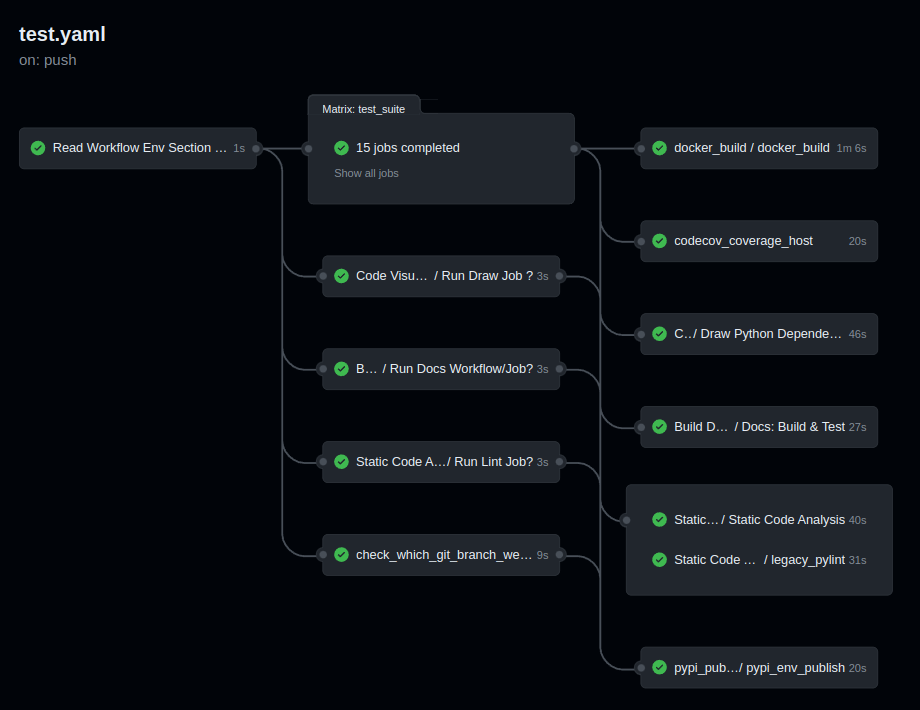- Generator of Python Project (see Quickstart), with CLI for Linux, MacOS, and Windows
- Option to Generate Python Package designed as module, module+cli, or pytest-plugin!
- Scaffold over 24 files, from Template, to have a ready-to-develop Project equipped with:
- Fully-featured CI/CD Pipeline, running on Github Actions, defined in .github/
- Continuous Delivery to PyPI (i.e. pypi.org, test.pypi.org) and Dockerhub
- Continuous Integration, with Test Suite running pytest, located in the tests dir
- Continuous Documentation, building with mkdocs or sphinx, and hosting on readthedocs, located in the docs dir
- Static Type Checking, using mypy
- Lint Check and Apply commands, using the fast Ruff linter, along with standard isort, and black
- Build Command, using the build python package
You can to be up and running with a new Python Package, and run workflows on Github Actions, such as:
Link: https://github.com/boromir674/biskotaki/actions/runs/4157571651
- CI Pipeline, running on Github Actions, defined in .github/
- Job Matrix, spanning different platform's and python version's
- Platforms: ubuntu-latest, macos-latest
- Python Interpreters: 3.7, 3.8, 3.9, 3.10, 3.11, 3.12
- Parallel Job execution, generated from the matrix, that runs the Test Suite
- Artifact store of Source and Wheel Distributions, factoring Platform and Python Version
- Job Matrix, spanning different platform's and python version's
Check the Biskotaki Python Package Project, for a taste of the project structure and capabilities this Template can generate!
It it entirely generated using this Python Package Template:
To install the latest Generator in your environment, run:
pip install cookiecutter-pythonThe generate-python (executable) CLI should now be available in your environment.
Next, create a file, let's call it gen-config.yml, with the following content:
default_context:
project_name: Demo Generated Project
project_type: module+cli
full_name: John Doe
email: john.doe@something.org
github_username: john-doe
project_short_description: 'Demo Generated Project Description'
initialize_git_repo: 'no'
interpreters: {"supported-interpreters": ["3.8", "3.9", "3.10", "3.11"]}To generate a Python Package Project, run:
mkdir gen-demo-dir
cd gen-demo-dir
generate-python --config-file ../gen-config.yml --no-inputNow, you should have generated a new Project for a Python Package, based on the Template!
The Project should be located in the newly created demo-generated-project directory.
To leverage all out-of-the-box development operations (ie scripts), install tox:
python3 -m pip install --user 'tox==3.27.1'To verify tox available in your environment, run: tox --version
Please, do a cd into the newly created directory, ie cd <my-great-python-package>.
To run the Test Suite, cd into the newly created Project folder, and run:
tox -e devAll Tests should pass, and you should see a coverage report!
To run Type Checking against the Source Code, run:
tox -e typeAll Type Checks should pass!
To setup a Git Repository, run:
git init
git add .
git checkout -b main
git commit -m "Initial commit"To setup a Remote Repository, run for example:
git remote add origin <remote-repository-url>
git push -u origin mainTo trigger the CI/CD Pipeline, run:
git pushNavigate to your github.com/username/your-repo/actions page, to see the CI Pipeline running!
Read the Documentation's Use Cases section for more on how to leverage your generated Python Package features.
To prepare for an Open Source Project Development Lifecycle, you should visit the following websites:
- PyPI, test.pypi.org, Dockerhub, and Read the Docs, for setting up Release and Documentation Pipelines
- github.com/your-account to configure Actions, through the web UI
- Codecov, Codacy, and Codeclimate, for setting up Automated Code Quality, with CI Pipelines
- https://www.bestpractices.dev/ for registering your Project for OpenSSF Best Practices Badge
Happy Developing!













